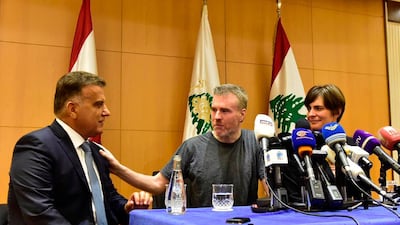Lebanon’s security chief Abbas Ibrahim’s successful mediation in releasing two tourists, one American and one Canadian, who were detained in Syria, has raised his country’s image abroad, decades after Syria used to negotiate the release of hostages kidnapped in Lebanon.
“What general Abbas Ibrahim does is very important for Lebanon,” said Nicolas Chedrawi, who heads a committee within President Michel Aoun’s Free Patriotic Movement that coordinates closely with the intelligence institution headed by Maj Gen Ibrahim, General Security, on the return of Syrian refugees.
Mr Chedrawi added that “he enhances Lebanon’s image abroad. It’s a reminder that we are important not only for the region, but also for the world, because we are a unique multi-religious society”. Lebanon is roughly divided in one third Christian, one third Shiite Muslim and one third Sunni Muslim.
Despite the political bickering that has paralysed the Lebanese cabinet for the past five weeks, Maj Gen Ibrahim announced the release of Canadian tourist Kristian Lee Baxter on Friday during a press conference in Beirut.
The 44-year old had been detained in December 2018 by Syrian authorities while on holiday.
On July 26, Maj Ibrahim secured the liberation of another Western tourist in Syria, US citizen Sam Goodwin, and on June 11, he accompanied Lebanese Internet specialist and US permanent resident Nizar Zakka on a private plane to Beirut after he was freed from a Tehran prison.
“Maj Gen Ibrahim has managed to create an image for himself of someone who can get results,” said Michael Young, editor the Carnegie Middle East program’s Diwan blog.
Moustapha Allouche, a member of the political bureau of the Future Movement, a party headed by the Prime minister, said that Maj Gen Ibrahim’s successful mediations reminded him of Syrian president’s Hafez al Assad multiple interventions to liberate hostages kidnapped during the Lebanese civil war “to gain points with foreign countries”. Syria has been struggling with its own civil war since 2011.
Since his appointment in 2011, the 60-year old official has imposed himself as an essential mediator with foreign countries despite being considered close to Lebanon’s two main Shiite parties, Amal and Iran-backed Hezbollah.
Because of the Lebanon’s confessional power structure, the head of General Security is always a Shiite Muslim Shiite, so Amal and Hezbollah have a strong say in choosing him.
Several sources suggested that Maj Gen Ibrahim’s unusually good relations with the US have been crucial in negotiating the recent release of Mr Baxter and Mr Goodwin.
“He regularly goes to Washington and is still considered to be an acceptable face of the Lebanese security system despite the increasing doubts voiced in the US about Lebanon’s collaboration with Hezbollah,” said Mr Young.
One of Lebanon’s most influential parties and an ally of Damascus, Hezbollah is considered to be a terrorist group by the US despite being one of the president’s main allies.
On July 9, the US treasury increased its pressure on the party by taking the unprecedented step of placing elected officials on a sanctions blacklist.
On Friday, the US justice department sentenced a Lebanese businessman and Hezbollah financier to five years in prison and ordered to pay $50 million.
Maj Gen Ibrahim’s ability to juggle relations with the US while maintaining close ties with Hezbollah and the Syrian authorities, probably forged while he worked in military intelligence before his appointment at the head of General Security, has worked in his favour, said Mr Chedrawi.
“This trust has helped Maj Gen Ibrahim to coordinate between the West and Syria, despite their relations being bad.”
But Maj Gen Ibrahim also made efforts to prove his neutrality, which has been appreciated by political parties that are not allied with Amal or Hezbollah.
“He’s very kind when he talks to politicians”, said Mr Allouche.
“He plays a role everybody needs and tries to look as neutral and as professional as possible.”
A source close to Maj Gen Ibrahim described him as “statesman” a description which cannot be applied to many Lebanese officials, often more eager to protect their religious community than serve the State.
The details of negotiations to free the US and Canadian detainees have remained secret, but Syria’s strong interest in engaging with the West after being side-lined for years by the international community signals that it would have been eager to use the two imprisoned tourists as "bargaining chips", said retired sociology professor and Hezbollah expert Waddah Charara.
“There are many things that Syria could ask for, including negotiating the freedom of at least two Hezbollah members detained in Canada”.
However, Maj Gen Ibrahim’s recent successes should not be exaggerated, argued Mr Allouche.
“It’s just progress that might one day lead to negotiations. But that’s very little compared to what Syria really wants, which is the West cooperating with the regime and investing in Syrian reconstruction.” The latter has been estimated to cost between $250 billion and $450bn by Syrian president Bashar al Assad. Releasing a handful of detainees will probably not be sufficient to convince the US or Canada to dish out even a fraction of such a sum.

